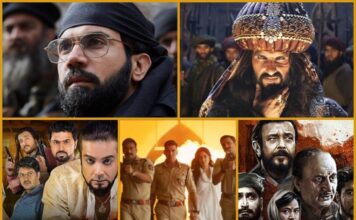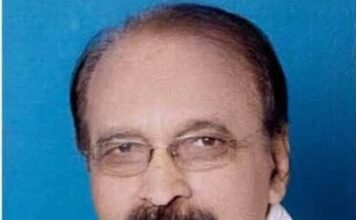Let a dozen NRI-PIO universities bloom
Indian Muslim media of 2007
Maulana Maududi’s Terrifying Vision for Indian Muslims
The photographer from Kabul
~Youth Views~ Western students exceed Lebanese expectations
Muslim youth feel the communication gap
Dignifying Lebanon’s past
Don’t forget African American Muslims
Indian Arrival Day not just for diaspora in Trinidad
UN Security Council seat: China outsmarts India
Charring the Kutch desert with charcoal
The BJP goes south: Declining charisma of Sonia Gandhi
Is the IAS fortress showing cracks?
The unseemly politics of terrorism in India
Quick media response reveals transparent gov’t in China
Iraqi Israeli, Arab Jew or Mizrahi Jew?
Will the contradict the diver?
An unmentionable truce?
Gordimer to ‘Post’: Israel must talk to its enemies
Don’t depend on outsiders to settle the Mideast dispute
Comrades hit where it hurts in Bengal panchayat polls
Management of contradictions key to India-Pakistan stability
Terrorism: A Political Cancer
The blasts in Jaipur (13th May 2008), have once again brought to fore the grim reality of global and local political scenario. In a short span of time close to hundred innocent lives were lost. What was heartwarming was the calm with which the society handled this grim tragedy. The amity with which the post blast situation was handled certainly needs million respectful salutes.
A welcome sign for Indian hockey
Hindu-Muslim unity: a historical speech by a leading Deobandi maulvi
Transforming police crucial to counter-terrorism
Christian underpinnings don’t deter secular Narnia fans
At least 14 dead in mounting South Africa xenophobic violence
Maulana Minnatullah Rahmani’s role in India’s independence
Elimination of British rule from India and independence of the country are great events of human history which not only abolished British kingdom but also left indelible mark on constitutional and political history of Arab world. The British were ruling in their own way on Arab countries due to their rule in India and almost the whole world was under their control as a super power.
Karnataka elections: an analysis of Muslim representations
Bush is right – but equally wrong: the global food debate
Jaipur blasts: a blessed occasion for B.J.P.
Nadwi on Maududi: a traditionalist maulvi’s critique of Islamism
Sports as business – the game is afoot!
Thackerays give a bad name to Maharashtra and Marathis
Dip in industrial growth: time to change gears
Bachchan and media trapped in jaded, dull matrimony
An innovative approach to Hindu-Muslim dialogue
Muslims must come out openly against terrorists
A nation riding on killer bicycles
Dravid’s stature as cricketer is undiminished
Black money: Indians and NRIs partners in crime
Settlement in Afghanistan: back to 1997?
Pokhran-III prospects dead on Pokhran-II anniversary?
Cynicism, casteism haunt women’s reservation bill
New Texts for Madrasas: Kerala Muslim Group’s Experiments in Curricular Reform
Is Arab media truly free?
Mideast conflict: need for a new perspective
Arab literature takes centre stage in London
Understanding Pakistan’s tribal areas
Are conditions ripe for negotiating with Iran?
Fiction meets reality in Egypt
On teaching Arabic in madrasas
30 year-old Muhammad Saleem Hayat is a Ph.D. student at the Department of Arabic, School of Languages, Jawaharlal Nehru University, New Delhi. His doctoral research project is on the teaching of Arabic in Indian madrasas and universities. He is presently the Associate Editor of the Urdu 'Sunday Indian' magazine.
Islam and the west – what Muslims should do?
Muslims and the West seem to be on collision course. I read every day in Urdu papers about the conspiracies the West hatches to attack and destroy Islam. Western countries do something or the other which offends Muslims and results in protests, street demonstrations and at times results even in violence.
Kashmir ‘packages”: when will they ever learn?
Democracy – inclusion or exclusion?
Barack Obama, who is in the race for being nominated as presidential candidate for America, made a remarkable speech on race relations in America. It was not merely complaining about discrimination against blacks (African Americans) but it was about extending hand of friendship towards whites so that people of America could stand together and form a more perfect union.
Conversion: a political weapon
One has been hearing a lot about the conversion activities of Christian missionaries. That there is a threat to Hindu nation due to Adivasis converting to a 'foreign religion' is becoming part of social common sense. The real face of the conversion came to fore when after the attack on nuns in Alibaug (March 2008) was followed by a massive conversion to Hinduism, Shuddhi ritual (April 27, 2008) in nearby Mumbai. The person involved in both these has been the same.
1857: first war of Independence?
Historians and historiographers are expected to study and narrate an event objectively and without showing loyalty to any affiliation – regional, communal or philosophical. People need pure and plain history, not a history coloured with saffron, red or green. But the history of Independence war in India is replete with violations of ethics of historiography.
Sending money home: top priority for NRIs
Journey to Hebron: nightmares and hope
Living conflict, writing peace
Muslims’ Contribution to the Growth of Music in India
Music continued to flourish in medieval India in spite of the acquisition of political power by the Turks, Afghans and Mughals. It was patronized and thrived at the imperial courts of Delhi and Agra and at the centers of provincial kingdoms like the Sharqui kingdom of Jaunpur, the Khilji kingdom of Malwa and the Bahmani kingdom of Bijapur and Golcunda.
Ahmadinejad’s visit – India intensifies global energy game
Government may have to pay high price for rising prices
For god’s sake, don’t exploit religion for political gain
IPL: Cricket-sangeet is a much simpler option
Indian hockey needs more than cosmetic changes
Lessons to be learned from Kerala Muslims
Protests apart, India’s image getting a boost Down Under
Karnataka polls will be crucial for Congress
Food crises or rising prices?
Religion and poverty
Jamaat-e-Islami Hind and the work of Indian Muslim educational reform
The reform of Muslim education, in particular bridging the gap between 'religious' and 'worldly' knowledge, has been one of the main focuses of the efforts of a range of South Asian Muslim reformists and revivalists over the past century and more.
National interest demands UPA, NDA forge common stand on N-deal
Burqas at the Airport
Democracy – Inclusion or Exclusion?
Separatism gets competitive in Kashmir valley
Karzai’s Afghanistan steps deeper into security quagmire
From Dubai to Doha
What is a vote worth in Iran?
Redefining the US-Pakistan partnership
Iran is not the enemy
Importing imams
Chasing phantoms: KPS Gill on madrassas
India must market for global satellite contracts
ISRO must market aggressively for global contracts
Prof. Akhtar-ul-Wasey on Islamic studies in India
Profesor Akhtar ul-Wasey is the head of the Department of Islamic Studies and the Director of the Zakir Husain Institute of Islamic Studies at the Jamia Millia Islamia, New Delhi. In this interview with Yoginder Sikand, he reflects on the functioning of the various Islamic Studies Departments in universities across India.
Q: How do you see the role of the Departments of Islamic Studies in those universities in India that have such departments?
Sarabjit’s execution can cast shadow on India-Pakistan ties
Is cheerleading culturally offensive? Ask Bollywood item numbers
South Asia’s tryst with democracy here to stay
Are Nepal Maoists more mature than Indian communists?
A visit to Darul Uloom Deoband – reflections of an NRI
My visit to Darul Uloom Deoband was on Sunday, 9th March 2008, unannounced for my own convenience. I was surprised to note that the historic madrasa was located right on the main highway between Saharanpur and Meerut (Uttar Pradesh). Its campus is spread out throughout the town surrounded entirely by Muslim neighborhood. The population of Deoband is about 100,000 with Muslims constituting 65% of it.
Raver communal riot: A sequence of events
Date: 13th April 2008. Time: Evening; people are gathering for Maghrib prayer at a mosque in Kotwal locality in Raver (Jalgaon). Timing may be a coincident or planned. A Ramnavmi procession goes past the mosque. Silently? No. The processionists raise volume of their audio system which plays slogans like 'mandir wahin banayenge' (we will build the temple there). Then they throw gulal (colours) incessantly and deliberately towards the mosque. This all culminated into what is everybody's guess. A communal riot.
Indians the world over excited by new ‘cricketainment’?
Origin of Muslims in India
We have one of the oldest and India's first masjid called the Cheraman Jama Masjid exists at Kodungaloor in Kerala. As inscribed on the masjid's stone-plate, (where this writer has been after the historic Tsunami in 2004), it was built about 1400 years ago in 9 Hijra or 629 CE). Kodungaloor was the capital of the kings of Kerala, and in 622-628 CE (Hijra 2 to 9) the ruler was a great savant, by the name of Cheraman Perumal Bhaskara Ravi Varma. In those days, the seniormost of the rulers of Kerala was called as Cheraman Perumal.
The ‘business’ of Maoist movement in India
India, China go their own way in Africa
Watch where the prices are going to judge government’s fate
Why did Congress leadership not back Rahul Gandhi as PM?
Will the Nepali Maoists go the Hamas way?
Rahul Gandhi: From diffident MP to PM candidate
No Mandal magic for Congress in Uttar Pradesh
It’s time NRI business leaders discovered Africa
India needs to shake hands with Maoists in Nepal
Noida incidents – collusion, connivance, or callous incompetence?
A ‘human right’ to attack handicapped woman?
While on Tibet, India and China beg some comparisons
IPL, or Indian Photography League?
Hectic lobbying on for NRI university
NDA should rise above parochial concerns on nuclear issue
High oil prices could hit India’s growth
Is there a silent apartheid against Dalit converts to non-Hindu religions?
Corridors of power and public space seem to be fully involved in the on-going debate with regard to the rights of Dalit converts to enjoy the reservation benefits even after converting to non-Hindu religions like Islam and Christianity.
Inclusive growth shouldn’t mean ignoring OBCs
Advani’s memoirs – raising more questions than answers
Is the Left’s third front hopes a pipedream?
Why no reservation to Dalit Muslims and Dalit Christians?
Will this past 3rd April prove to be a turning point for Dalit Muslims and Dalit Christians in India? If you ask me, I would say, yes. Because this is the day when the National Commission for Minorities (NCM) came up with a much-needed report on these Dalits.
The symbol of liberation: a hi-tech madrassa
Set amidst the sylvan surroundings of Rajasthan's Ramgarh town, 10 km from the Jaipur railway station, is a sprawling stretch of 173 green acres encircled by a tranquil valley and cool lake - this is where you will find a completely new experiment with the traditional madrassa education system, the Madrassa Jameatul Hidaya.




